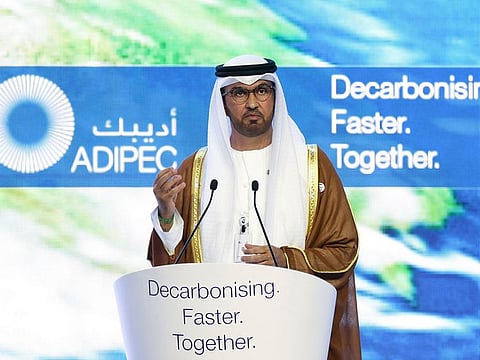ADIPEC 2023: Energy industry must shed its 'part of the problem' status on climate change, says Dr. Al Jaber
UAE's Dr. Al Jaber says energy players need to be central to solving climate issues

Dubai: In a call for immediate action, the UAE’s Dr. Sultan Al Jaber has called for the energy sector to step up to play its part in taking on climate change.
And play that part in full.
“This industry has been viewed as part of the problem - that is not doing enough,” said Dr. Jaber at the opening of the energy sector event ADIPEC ’23. “And in some cases, even blocking progress. This is your opportunity to show the world you are central to the solution.”
This is where the energy challenge lies
Global economies currently rely on the equivalent of 250 million barrels of oil, gas, and coal daily. The need is to replace - or decarbonise - these energy sources to pave the way for a sustainable future, according to Dr. Sultan Al Jaber.
According to him, the oil and gas industry could change the global debate. “It is time to silence the sceptics by applying strength, capital and technology to deliver real outcomes and tangible results,” said Al Jaber, who is the UAE’s Minister of Industry and Advanced Technology and head of ADNOC Group.
Some of the trends are indeed encouraging, such as attracting record-breaking ‘cleantech’ investments of $1.7 trillion, the addition of 440GW of renewable energy to global grids in 2023, and a threefold increase in electric vehicle sales in three years.
However, what’s needed is a well-managed and equitable energy transition plan.
“These are barrels that must be either replaced - or de-carbonised - to create a proper yet responsible rock climate, a pro-growth future,” he said. “It is one humungous task and a historic opportunity for growth and innovation.
“This represents the largest economic opportunity since the first Industrial Revolution.”
A 3-pronged strategy
Progress is being made on renewables
On the plus side, adoption of renewable energy has gained momentum, driven partly by disruptions in global oil and gas markets due to events like the Russia-Ukraine issue. The International Energy Agency has called for a significant increase in clean energy spending, from $1.8 trillion in 2023 to $4.5 trillion annually within the next decade, to try and limit global warming to 1.5°C.
Additionally, IEA stressed the importance of tripling global renewable energy capacity to 11,000 GW by this decade’s end.
“Together, we must overcome the hurdles to scale up and commercialise hydrogen and carbon capture technology,” said Al Jaber. And bringing up the the findings by Intergovernmental Panel on Climate Change (IPCC), he stressed reducing emissions by at least 43 per cent over the next 7 years to keep the 1.5°C target within reach.
Describing this as the industry's 'Northstar' to reach, the UAE Minister acknowledged that doing so hinges on 'respecting science while ensuring human prosperity'.
COP28 bound
In his vision for COP28, Al Jaber declared it must be a turning point and 'propel us toward the 2030 climate goals'.
“We don’t claim that we have all the answers; nobody has all the answers,” he said. “But working together, we can lay a solid foundation for a climate-positive economic sustainability.”
“No other industry has the same ability to manage complexity, depth of knowledge, engineering, talent, capital, technology and scale that is needed for the task,” said Dr Al Jaber. “And that’s why today I stand before you filled with hope, optimism and confidence that this industry can step up and make a meaningful contribution to tangible, sustainable progress.”
Sign up for the Daily Briefing
Get the latest news and updates straight to your inbox







